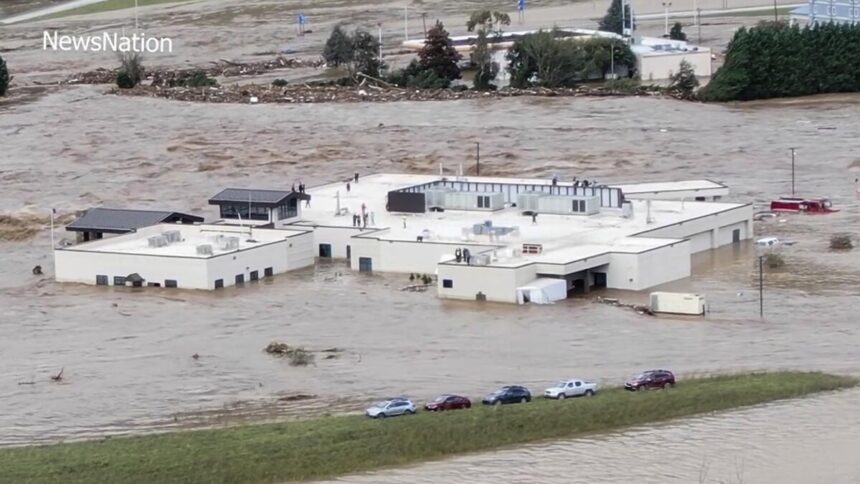Hurricane Helene’s path of destruction, though initially expected to remain offshore, has left its mark in areas far from the typical hurricane zones. Tennessee, a state usually unscathed by hurricanes, is grappling with significant weather-related challenges after being caught in the remnants of Hurricane Helene’s impact. As powerful winds and torrential rains sweep through, communities are left dealing with flash floods, property damage, and unexpected disruptions to daily life.
The Unfolding of Hurricane Helene’s Path Across the Atlantic
Hurricane Helene’s formation in the Atlantic was closely monitored by meteorologists, who initially believed that it would be a low threat to mainland areas. However, the storm’s path shifted unexpectedly, transforming it into a significant weather system. As Hurricane Helene’s journey progressed, it gradually weakened, downgrading from a full hurricane to a post-tropical cyclone. Despite the downgrade, the storm retained enough strength to cause serious disruptions in regions that typically don’t bear the brunt of hurricane-force conditions.

Tennessee Faces Unexpected Weather Challenges
As the remnants of Hurricane Helene’s system approached Tennessee, the state braced for weather that is both unusual and potentially dangerous. Tennessee, being far from the coastal regions usually hit by such storms, rarely prepares for hurricane aftermaths. However, Hurricane Helene’s presence brought heavy rains, dangerous winds, and localized flooding, disrupting the lives of residents across the state.
Local meteorologists issued warnings, emphasizing the severity of flash flooding risks and urging residents to take precautions. Several counties in Tennessee experienced widespread flooding as rivers and streams surged beyond their banks. This led to road closures, damage to properties, and interruptions in power supplies. For many residents, the storm was a reminder of how unpredictable weather patterns can impact even regions that don’t typically experience such extreme conditions.
The Impact on Rural and Urban Communities Alike
In both rural areas and urban centers across Tennessee, the impact of Hurricane Helene’s remnants has been profound. Floodwaters inundated neighborhoods, sweeping away cars and damaging homes. Agricultural areas, especially vulnerable to heavy rains, suffered considerable losses as waterlogged fields jeopardized crops that were close to harvest. For many farmers, Hurricane Helene’s arrival marks a devastating end to a growing season that was already strained by earlier weather conditions.
Urban areas, though better equipped to handle stormwater runoff, still experienced significant disruptions. Nashville, Knoxville, and surrounding cities reported infrastructure damage, with some residents forced to evacuate due to rapidly rising water levels. Emergency services were on high alert, with rescue teams assisting in evacuations and ensuring that residents were taken to safety. For those who could not leave, shelters were set up to provide temporary refuge.
Tennessee’s Emergency Response: A Community United by Crisis
One of the defining aspects of Hurricane Helene’s impact on Tennessee has been the swift response by both local authorities and the community at large. Emergency services, already prepared for heavy weather due to earlier forecasts, mobilized quickly to prevent further disaster. Power companies worked around the clock to restore electricity to the thousands of homes affected by outages. Meanwhile, community members came together, offering help to neighbors and friends in need.
Volunteer efforts played a significant role in lessening the effects of the storm. In flood-prone areas, residents teamed up to lay sandbags around homes and businesses to protect properties from the rising water. Local organizations and businesses donated food, water, and other essential supplies to those in need, helping families who had to evacuate their homes.
The sense of unity that emerged during Hurricane Helene’s onslaught speaks to the resilience of Tennessee’s communities. In the face of nature’s unpredictable force, people have rallied to support one another, providing hope in the storm’s darkest moments.
Economic Ramifications of Hurricane Helene’s Wrath
Hurricane Helene’s impact will be felt long after the floodwaters recede. The economic toll of the storm is expected to be significant, especially for farmers who have lost entire fields of crops. Tennessee’s agricultural sector is already struggling, and this blow is likely to increase financial hardships for farmers and rural communities dependent on agriculture.
In urban areas, the cost of repairs to infrastructure—roads, bridges, and buildings—will likely add up quickly. Insurance companies are already bracing for a flood of claims as homeowners assess the damage to their properties. Small businesses, too, are facing recovery challenges, with many having to close temporarily due to flood damage or power outages.
Despite these challenges, Tennessee’s state government has already begun talks about disaster relief funding to aid recovery efforts. Early estimates suggest that the storm’s total economic impact could reach into the millions, but the true cost will likely depend on how quickly recovery efforts can get underway.
Preparing for Future Storms: Lessons from Hurricane Helene’s Impact
Hurricane Helene’s unexpected impact on Tennessee has sparked new discussions about the state’s preparedness for extreme weather events. While hurricanes are not common in Tennessee, the remnants of storms like Hurricane Helene’s can still cause significant damage. The state has already made strides in preparing for such events, with investments in infrastructure improvements aimed at reducing the risks of flooding and improving stormwater management.
The response to Hurricane Helene’s impact has shown that Tennessee is capable of handling such crises, but it has also highlighted areas where more work is needed. Local leaders are advocating for even stronger infrastructure investments and enhanced emergency response plans to better protect residents in the future. The unpredictable nature of storms like Hurricane Helene’s means that even non-coastal areas like Tennessee must remain vigilant and prepared for extreme weather.
The Road to Recovery: What’s Next for Tennessee?
As the state begins the recovery process, many residents are focused on rebuilding their lives. For some, this means repairing homes and replacing lost possessions; for others, it’s about starting over entirely. Local governments are working to assess the full extent of the damage and to coordinate relief efforts with state and federal agencies.
One positive outcome of Hurricane Helene’s impact has been the sense of community that has emerged. Across Tennessee, people are stepping up to help those in need, whether by offering shelter, donating supplies, or simply providing moral support. This spirit of cooperation will be crucial in the coming weeks and months as Tennessee works to recover from the storm’s devastation.








